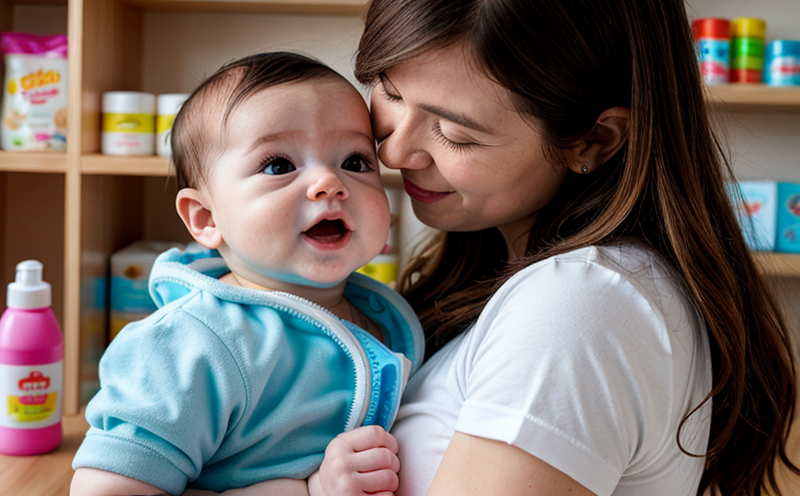Bottle Durability Testing under Pressure
In the realm of consumer products and product safety testing, ensuring the durability and safety of baby bottles is a critical responsibility. Baby bottles are subjected to rigorous testing that mimics real-world conditions to guarantee their safety, reliability, and performance. Bottle durability testing under pressure focuses on evaluating how these containers withstand mechanical stress, temperature variations, and other environmental factors. This service ensures that products meet industry standards and consumer expectations.
The primary purpose of this test is to assess the structural integrity of baby bottles, particularly under conditions where they may experience high internal pressures due to improper handling or use. This can include situations such as being accidentally squeezed by a toddler or dropped on hard surfaces, which can lead to cracks or leaks that could pose health risks.
The testing process involves simulating various scenarios that the bottle might encounter during its lifecycle. For instance, it evaluates how well the bottle retains its shape and functionality after exposure to extreme pressure. The test also checks for any potential weaknesses in the material composition of the bottle, which can compromise its safety under stress.
It is essential to note that this testing aligns with international standards such as ISO 8682 (Plastics - Polyethylene - Determination of mechanical properties) and ASTM F967-14 (Standard Test Method for Determination of Tear Strength of Flexible Packaging Films and Sheeting). These standards ensure that the tests are conducted in a consistent, replicable manner across different laboratories.
The results of this testing provide valuable insights into the durability and safety of baby bottles. They help manufacturers identify potential weaknesses in their products early on, allowing for timely corrections before mass production begins. This not only enhances product quality but also ensures compliance with regulatory requirements, thereby protecting public health and safety.
Why It Matters
Baby bottle durability testing under pressure is a crucial aspect of ensuring the safety and reliability of baby products. The fragility and frequent handling by infants make these bottles susceptible to accidental damage that could lead to potential hazards. By conducting this test, manufacturers can identify any structural flaws or material weaknesses in their products before they reach the market.
The importance of this service extends beyond just product integrity; it also plays a vital role in maintaining consumer trust and satisfaction. Parents rely on baby bottles as essential feeding tools for their infants, and knowing that these products are rigorously tested instills confidence in both parents and regulatory bodies alike.
Furthermore, compliance with relevant standards such as ISO 8682 and ASTM F967 ensures that the testing process is consistent across different laboratories. This consistency is crucial for maintaining high-quality standards and ensuring that all baby bottles meet the necessary safety criteria.
Scope and Methodology
| Test Parameters | Description |
|---|---|
| Internal Pressure Simulation | The bottle is subjected to a range of pressures to simulate real-world scenarios where the bottle might be exposed to high internal pressure. |
| Mechanical Stress Testing | The bottle undergoes various mechanical stress tests to evaluate its structural integrity under different conditions. |
| Material Composition Analysis | The chemical composition of the bottle material is analyzed to ensure it meets safety and durability standards. |
The testing process begins with preparing the specimen, which involves ensuring that the bottle is in pristine condition. The bottle is then placed into a controlled environment where specific pressure levels are applied. This setup allows for the observation of how the bottle responds to different stress conditions. Once the test is concluded, the results are analyzed thoroughly to determine whether the bottle meets the required durability standards.
The methodology used in this testing adheres strictly to international standards such as ISO 8682 and ASTM F967-14, ensuring that the process is consistent and replicable. This approach not only enhances product quality but also ensures compliance with regulatory requirements, thereby protecting public health and safety.
Industry Applications
- Ensuring infant safety by identifying potential weaknesses in bottle design.
- Meeting international standards for baby product durability.
- Enhancing consumer trust through rigorous testing processes.
- Facilitating compliance with regulatory requirements.
| Industry Standards | Description |
|---|---|
| ISO 8682 | Determination of mechanical properties for polyethylene plastics. |
| ASTM F967-14 | Standard test method for determination of tear strength of flexible packaging films and sheeting. |
The application of this testing service is widespread across various sectors, including infant formula manufacturers, healthcare providers, and government regulatory bodies. By ensuring the safety and reliability of baby bottles through rigorous testing, these entities can protect public health while maintaining consumer trust.





